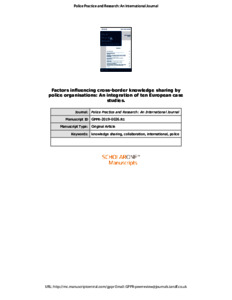BIRDI, K., GRIFFITHS, Kerry, TURGOOSE, C., ALSINA, V., ANDREI, D., BĂBAN, A., BAYERL, Petra Saskia, BISOGNI, F., CHIRICĂ, S., COSTANZO, P., FERNÁNDEZ, C., FICET, J., GASCÓ, M., GRUSCHINSKE, M., HORTON, K., JACOBS, G., JOCHOMS, T., KRSTEVSKA, K., MIRCEVA, S., MOUHANNA, C., VAN DEN OORD, A., OȚOIU, C., RAJKOVCEVSKI, R., RAȚIU, L., REGULI, Z., RUS, C., STEIN-MÜLLER, S., STOJANOVSKI, T., VALLET, N., VARGA, M., VÍT, M. and VONAȘ, G.
(2020).
Factors influencing cross-border knowledge sharing by police organisations: an integration of ten European case studies.
Police Practice and Research, 1-20.
[Article]
Documents
26922:554534
![[thumbnail of gppr.pdf]](https://shura.shu.ac.uk/26922/1.hassmallThumbnailVersion/gppr.pdf)

Preview
PDF
gppr.pdf
- Accepted Version
Available under License All rights reserved.
Download (306kB)
|
Preview
Abstract
© 2020, © 2020 Informa UK Limited, trading as Taylor & Francis Group. The globalisation of crime means there is an increasingly vital need for effective sharing of knowledge by police organisations across international borders. However, identifying the complexities and challenges of this aspect of international collaboration has been relatively neglected in previous research. The research reported in this paper therefore set out to identify the major barriers and facilitators of international knowledge sharing. Research teams in ten European countries produced ten case studies of knowledge sharing across borders, either involving direct cooperation between police forces in different countries or through international agencies such as CEPOL or INTERPOL. The integrative findings showed that the major influences on knowledge sharing could be theoretically categorised in terms of organisational factors (e.g., technological and staff capabilities), inter-organisational factors (e.g., quality of relationships, shared visions and systems), inter-country factors (e.g., bilateral conventions, legislation) and knowledge characteristics (e.g., clarity, legal sensitivity). Practical implications include standardising technology systems across countries, improving inter-organisational trust through exchanges and physical co-working, developing police members’ knowledge and skills with regards to collaborative working and creating joint agreements and visions. Research implications highlighted the need to test the findings in non-European contexts and to comparatively focus on specific types of collaboration.
Actions (login required)
 |
View Item |



 Tools
Tools Tools
Tools